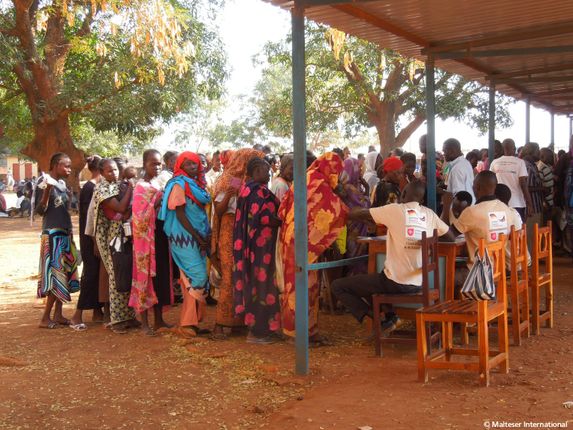
South Sudan: Reducing the vulnerability of IDPs and their host communities
Malteser International has been supporting displaced persons in and around the city of Wau since 2014. The city hosts around 100,000 people who have fled fighting in neighboring villages. While 40,000 live in designated camps for displaced persons, another 60,000 have sought refuge elsewhere within the city. Years of conflict, climate change impact and economic failure have led to a severe food crisis in the camps and in the host communities. Other problems include inadequate water supply and sanitation, causing water-borne diseases to spread easily. Furthermore, water scarcity fuels inter-community conflict. As in most cases, the most vulnerable groups such as women, children and the elderly bear the most brunt.
We are working to help internally displaced persons and host communities enjoy greater food security, better access to clean water and hygiene.
Malteser International continuosly adapts its programs to the rapidly changing emergency situation in Wau town. By drilling wells in the city and distributing hygiene kits, we aim to fight the spread of water-borne diseases while improving the health and wellbeing of everyone in the community. Our school meal project combines hygiene and nutrition trainings to ensure that children eat at least one warm, nutritious meal every day at school. These meals also function as an incentive for parents to send their children to school, especially girls.
- Improved food and nutrition security of particularly vulnerable household
- Better access to water and sanitation
- Improved food security and hygiene for primary school children
- Increased enrolment and retention rates in schools, especially for girls.
- Provision of school meals for primary schools, cooking equipment, and renovation of water access points combined with hygiene sensitisation activities and trainings
- Drilling of wells and upgrading of existing water distribution systems with solar powered hand pumps
- Fostering of community driven water management structures
- Capacity strengthening activities for community members involved in water management
- Construction of emergency latrines and other sanitary facilities
- Distribution of hygiene kits followed by training on proper use
- Distribution of water tanks
- Monthly Cash-Based Transfers (CBT) for the most vulnerable households
Country info
Capital: Juba
Area: 644,329 km²
Population: ca. 12 million
Project Data
Donor: German Federal Foreign Ministry (AA), Aktion Deutschland Hilft (ADH)








